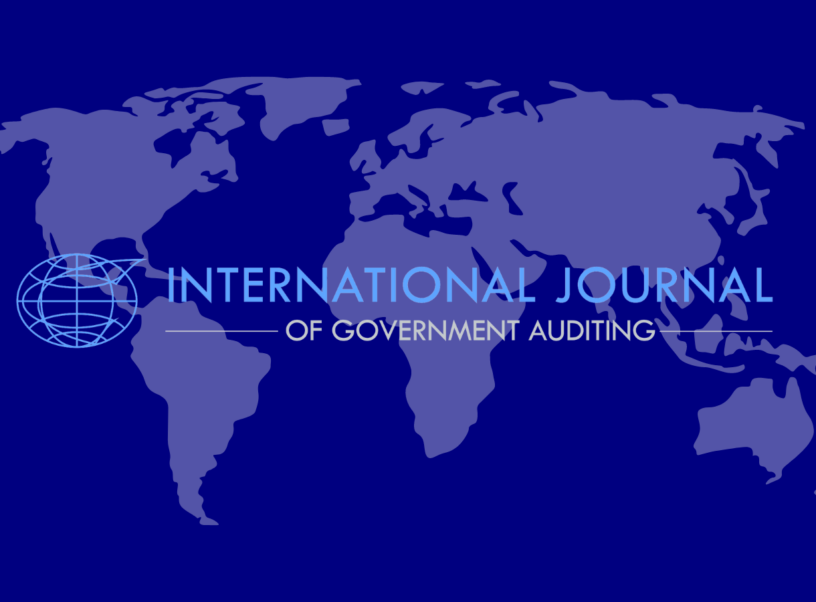
Our Story
As the official publication of INTOSAI, the International Journal of Government Auditing (the Journal), was established to support cooperation, collaboration, and continuous improvement of communication among SAIs and the broader audit community. The Journal aims to promote the advancement of government auditing procedures and techniques, and the exchange of ideas and experiences in the field of public accounting and financial control.
The Journal is published quarterly in Arabic, English, French, German and Spanish, the five INTOSAI official working languages. As the official publication of the International Organization of Supreme Audit Institutions (INTOSAI), the Journal supports cooperation, collaboration and knowledge sharing among Supreme Audit Institutions (SAI) and the broader accountability community.
The U.S. Government Accountability Office publishes the Journal on behalf of INTOSAI through the auspices of the International Journal of Government Auditing, Inc. Opinions and beliefs expressed are those of the editors or individual contributors and do not necessarily reflect the views or policies of INTOSAI.
Our Vision

The Journal aims to be a more robust, helpful instrument for auditors, a conduit for learning, a path to promote transparency and good governance, a means to communicate and transfer knowledge and experiences. The INTOSAI community has thoroughly embraced the notion of developing and cultivating innovative practices that enable SAIs to gain and enhance competencies.

In an effort to help fulfill this endeavour, the Journal promotes capacity building by highlighting tools, guidance and testimonials from the audit community, inspires contributions and encourages the sharing of best practices. To broaden international auditing visibility, foster connectivity, and boost collaborative efforts, building on existing opportunities and relationships to share auditing news is key. Technical articles, spotlights on key areas, news, and links to published newsletters and journals developed by the various working groups, committees and regions throughout INTOSAI are just some of the things we can exchange to encourage readership and engagement.

The Journal is a steadfast source of collaboration within the INTOSAI community. By combining resources, using media at INTOSAI’s disposal, and avoiding duplication of efforts can increase INTOSAI’s efficiencies in disseminating news and events on a global scale. By working together with the INTOSAI community, the Journal will create an exciting, informative, educational reading experience that can further enable capacity building and grow from best practices in communication.
Additional Reading
Our Editorial Team
Production & Design Team
Associate Editors
Board of Editors
Executive Leadership
The Elmer B. Staats Award
The Elmer B. Staats Award is meant to encourage excellence in writing articles for the INTOSAI Journal. The award also commemorates important contributions Dr. Elmer B. Staats, former Comptroller General of the United States and former chairman of the Journal’s Board of Editors, made to the Journal.

Winners
2016
Nepal2013
China2010
Netherlands2007
Canada2004
Tunisia2001
Iceland1998
Nepal1995
Germany1992
Pakistan (tie)1992
United Kingdom (tie)1989
Canada1986
Philippines1983
IsraelThe Judging Process
At each International Congress of Supreme Audit Organizations (INCOSAI), the Journal presents the Staats Award to the author of the best article published by the Journal over the previous three years. If the author is unable to attend, the head of the delegation from the winning author’s country accepts the award and is then expected to make an appropriate presentation upon returning home.
The Terms of Reference for the Staats Award were established by the International Organization of Supreme Audit Institutions (INTOSAI) Governing Board in 1982, and amended in 1994 and 2012. These terms of reference are to be reviewed and confirmed every six years to ensure they remain relevant and effective.The next re-approval is scheduled to take place in 2023.
Members of the Board of Editors and Associate Editors of the Journal judge the articles. Judges examine eligible articles, select those they consider most worthy and rank them according to the following five criteria: originality and contribution to knowledge; evidence of research; imaginative treatment; literary merit; and subject matter.
The judges of the Staats award include: The Board of Editors: SAIs of Austria, Canada, Tunisia, United States of America and Venezuela, and; Associate Editors: General Secretariats of AFROSAI, ARABOSAI, ASOSAI, CAROSAI, EUROSAI, OLACEFS and PASAI.
The results of the final assessment, according to the five stated criteria, are tabulated by the Journal’s editor. The identity of the winner is sealed until the award ceremony at INCOSAI.
